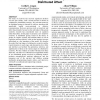Free Online Productivity Tools
i2Speak
i2Symbol
i2OCR
iTex2Img
iWeb2Print
iWeb2Shot
i2Type
iPdf2Split
iPdf2Merge
i2Bopomofo
i2Arabic
i2Style
i2Image
i2PDF
iLatex2Rtf
Sci2ools
150
click to vote
CHI
2011
ACM
2011
ACM
Collaborative creativity: a complex systems model with distributed affect
The study of creativity has received significant attention over the past century, with a recent increase in interest in collaborative, distributed creativity. We posit that creativity in distributed groups is fostered by software interfaces that specifically enable socio-emotional or affective communication. However, previous work on creativity and affect has primarily focused on the individual, while group creativity research has concentrated more on cognition rather than affect. In this paper we propose a new model for creativity in distributed groups, based on the theory of groups as complex systems, that includes affect as well as cognition and that explicitly calls out the interface between individuals as a key parameter of the model. We describe the model, the four stages of collaborative creativity and the causal dynamics in each stage, and demonstrate how affect and interface can facilitate the generation, selection, and amplification of ideas in the various stages of collabor...
CHI 2011 | Collaborative Creativity | Computer Supported Cooperative Work | Creativity Model | Human Computer Interaction |
Related Content
| Added | 25 Aug 2011 |
| Updated | 25 Aug 2011 |
| Type | Journal |
| Year | 2011 |
| Where | CHI |
| Authors | Cecilia R. Aragon, Alison Williams |
Comments (0)

